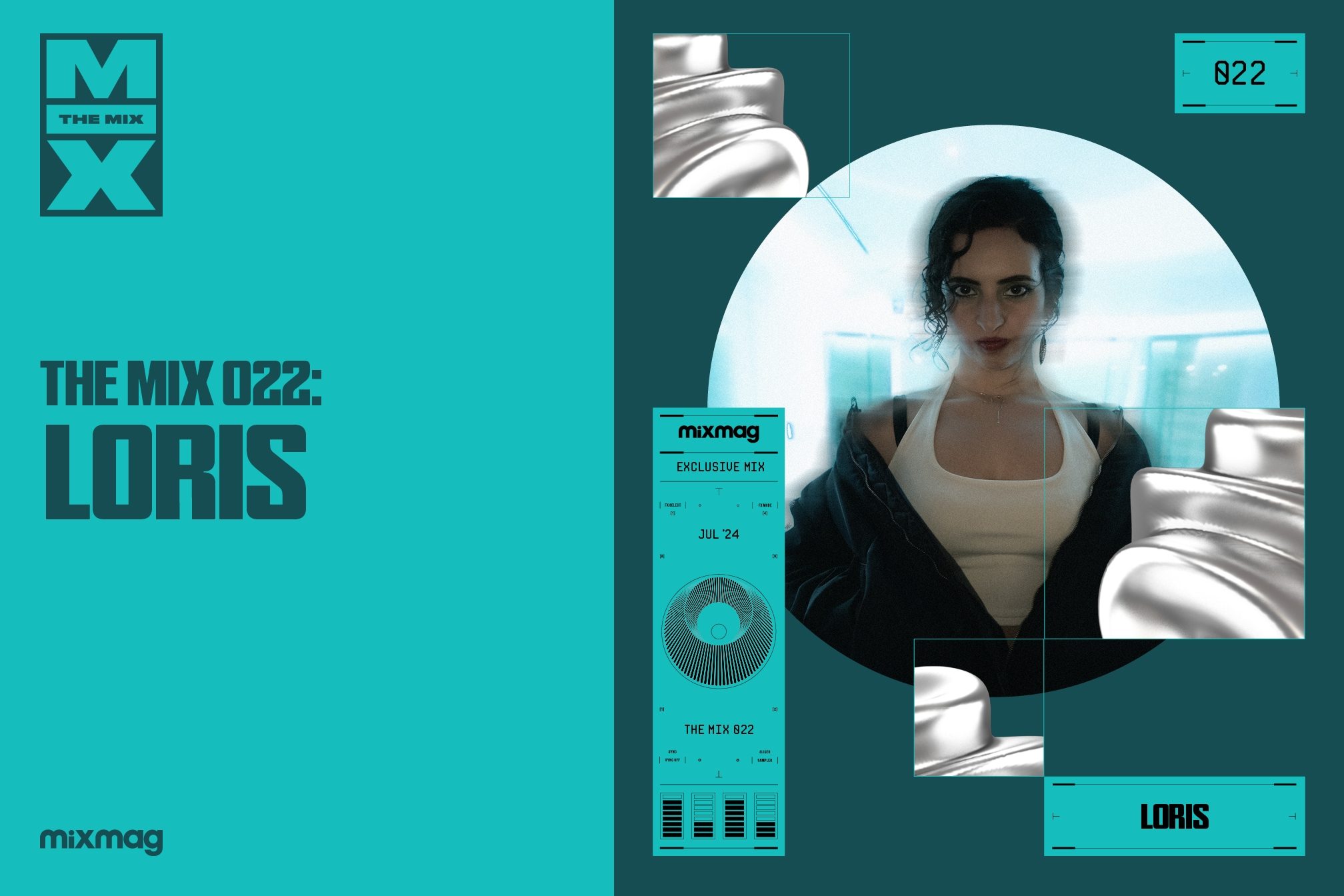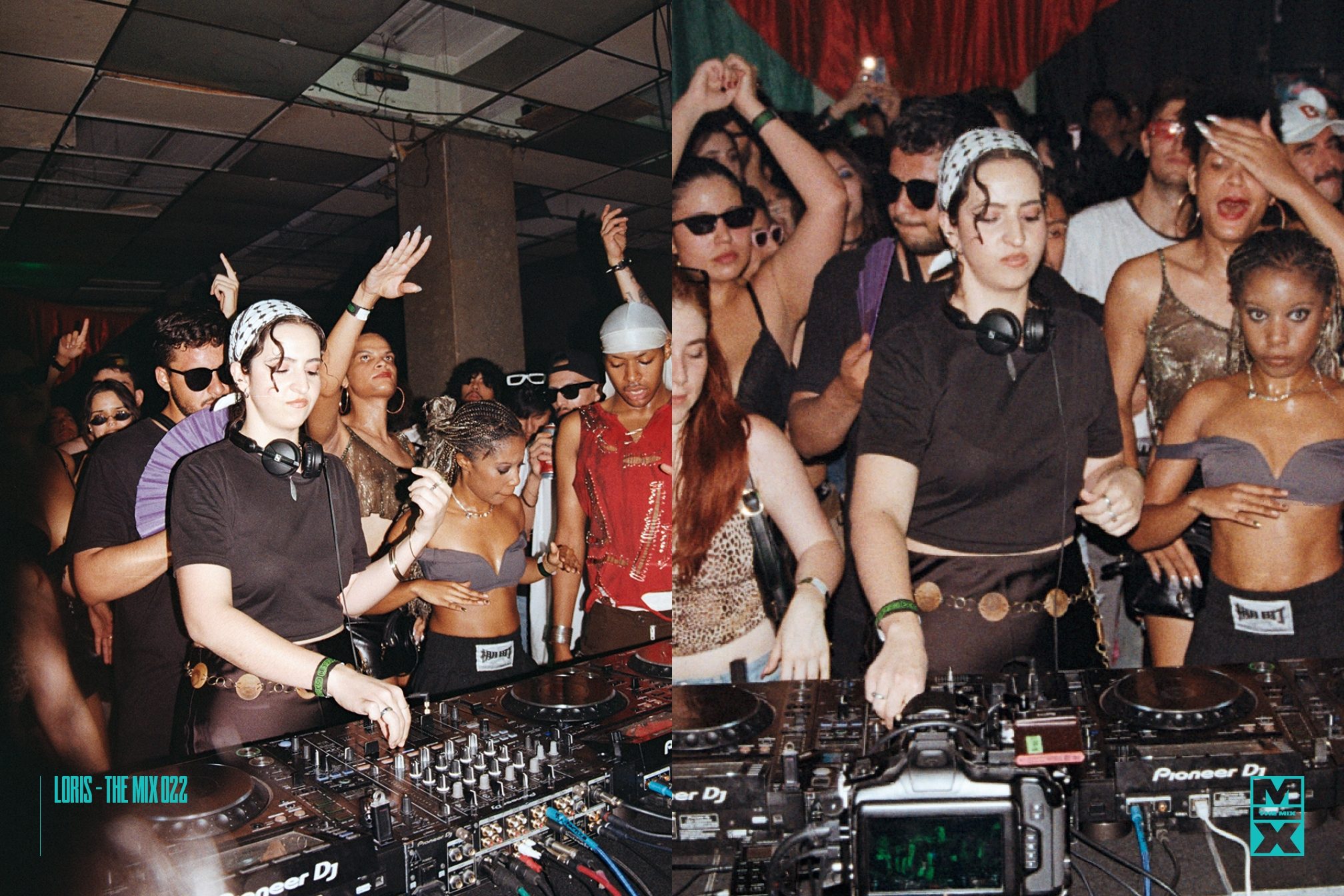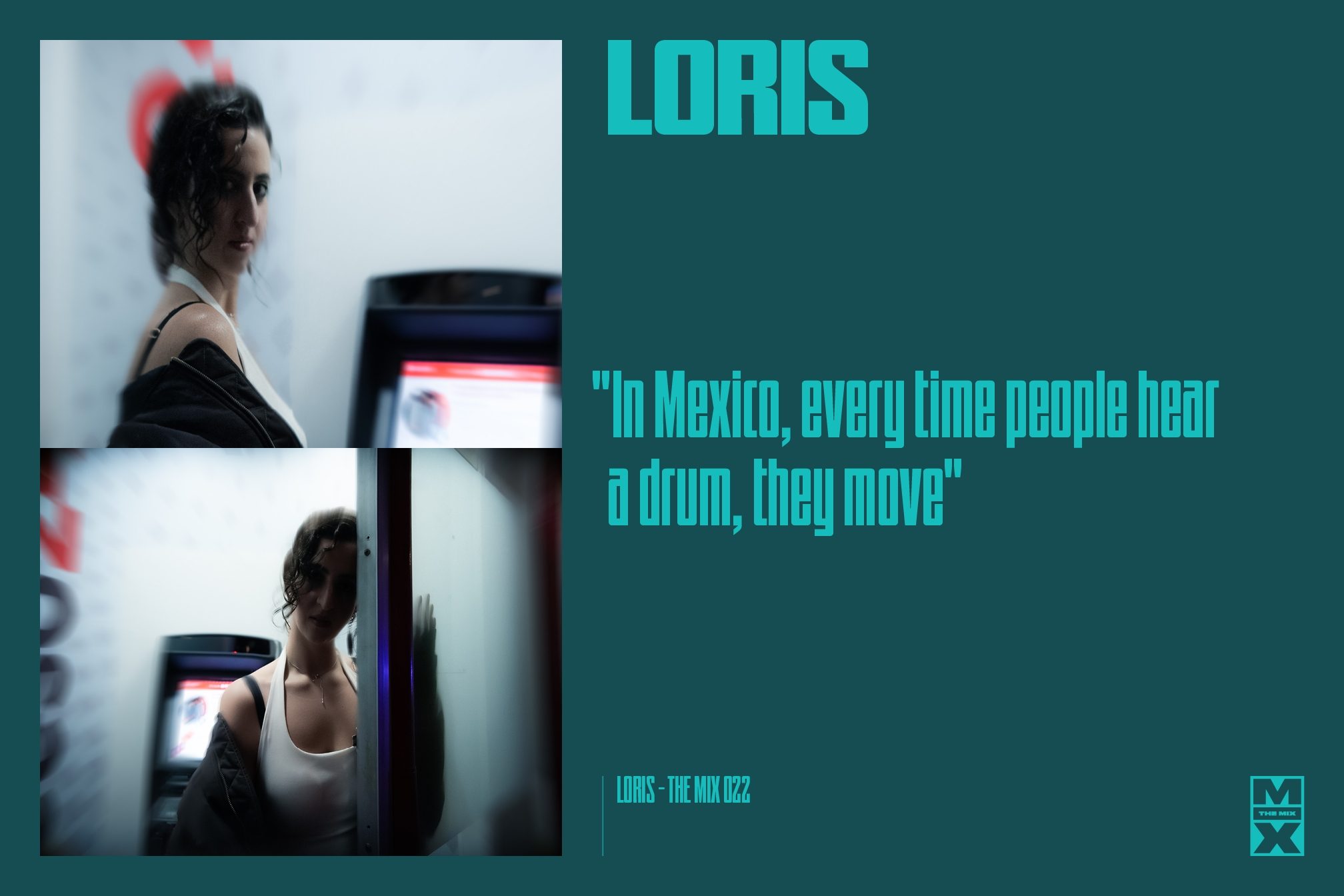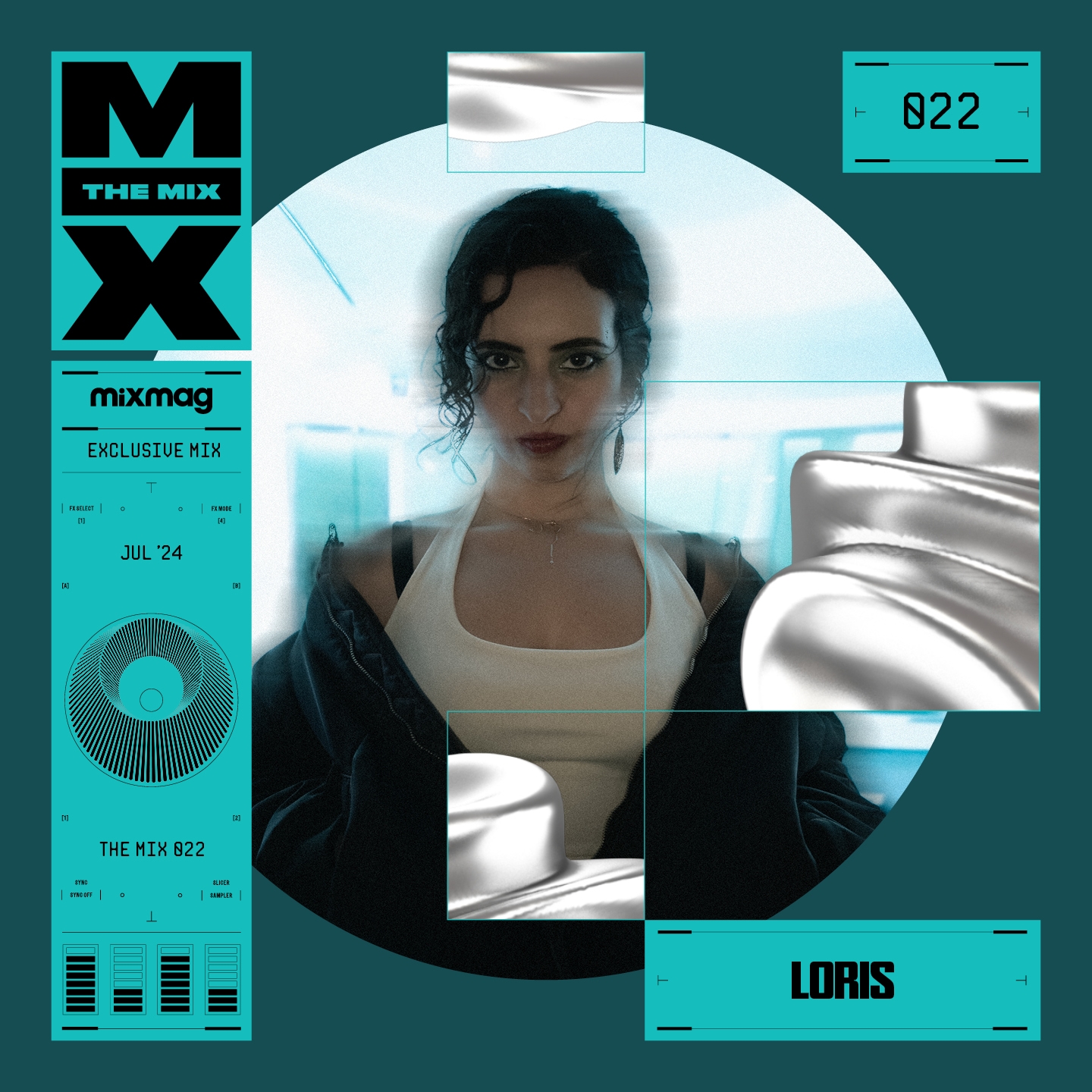 Music
Music
The Mix 022: Loris
Mexican-Palestinian producer and DJ Loris is crafting her own blend of techno from the rich rhythms of her roots and electrifying Mexico City's thriving queer scene
Loris is a priestess of percussion. In less than a decade, the Mexico City-based DJ has gained local clout and international traction for her dance-driven sets, which pulse with technical prowess and the eclectic sounds of her dual Middle Eastern and Latin heritage.
Mixmag first met Loris a year ago in La Faena, a bullfighting museum and cantina in the Historic Center of Mexico City, while the warped, electro-licked 'La Cumbia de Cerveza' melted out of a jukebox. Tables of highly-styled CDMX clubgoers packed out the place alongside Salsa musicians and older folks to belt out ballads, sling cervezas, move their hips, and push more pesos into the machine. Behind a tray of mezcal and Modelos, Loris was dressed in an onyx trench, flanked by oil paintings of valiant Matadors, projecting a palpable passion for conquering scenes and for what the future holds.
Read this next: The Mix 021: CRRDR
It might have seemed like an unlikely haunt for a burgeoning electronic artist to frequent, but looking back, the juxtaposition of Loris and La Faena (which translates to "things that must be done") was poignant, to say the least. Fast forward a year, and she's gained traction and industry nods from a string of singles, including 'Lulua', a throbbing ambient track laced with crashing waves recorded in the Arabian Gulf and Oud, and a pulsating collaboration with Lila Tirando A Violeta, ‘Caminos del Deseo’, on NAAFI. She's also delivered thunderous sets supporting Overmono and Four Tet, made a Keep Hush debut, released a synth-laden EP, 'Acid Bloom', and drops hints about new music in the works for Colombian imprint TraTraTrax.
More than that, she's commanded dancefloors amid tragedy and honoured her ancestors to prove that her roots will never be erased or her music ever silenced as the only female Palestinian DJ and producer in Mexico City, and possibly Latin America.
While gearing up for a European/UK tour and summer EP release, Loris caught up with Mixmag to chat about what shaped her sonic aesthetic and share a mix that showcases why her name is reverberating in Mexico City's thriving queer scene and making waves across the globe.

You were born in Saltillo, north-eastern Mexico, with Palestinian heritage. Tell us about your first introduction to music.
I grew up listening to classical Arabic music without understanding the language. From birth, I became familiar with a lot of different tempos, instruments, and Middle Eastern sounds thanks to my dad, who played it in the house. I was always so curious about how tightly linked Latin and Arabic music was, from the percussion to the improvisation with the accordion, even the same BPM.
What led you to DJing?
It all started because I wanted to dance to this fusion of music, and I was constantly digging to find tracks. Since high school, every time I showed up to a party, people would say, "The music's arrived!". I always had my iPod with a playlist. I'd plug it in and mix these amazing Middle Eastern wedding songs with cumbia, and the room would go crazy. By university, I was getting deeper into electronic music and had joined a cumbia collective in Monterrey.
[Cumbia from Monterrey is no joke. In the 1950s and 60s, when vinyl records from all over Latin America started filtering into town via Mexico City and the USA, an iconic DJ named Gabriel Dueñez was crowned "the creator of lowered cumbia." Thanks to the motor of his record player overheating, the revolutions slowed down, and the snare drum, accordion and guacharara became the dub of Monterrey cumbia. Disenfranchised folks threw vibrant parties called sonideros to celebrate the warped genre. By the '80s, the "Accordion Rebel" and his band Celso Piña Y Su Ronda Bogotá populated cumbia from the poor by racking up radio play. Not long after, the counterculture of Kolombia was born: a lifestyle centred around dancing and listening to "cumbia rebajada" (slowed down Columbian cumbia) which was adopted by gangs called Cholombianos and inspired the cult Netflix film I'm No Longer Here / Ya No Estoy Aqui. A new wave of DJs and producers formed collectives, threw soldiers, put the industrial city on the map and drove record sales nationwide.]
I had passion and energy, so I approached this collective Rebajado MX during the cumbia hype, and they brought me in as the only girl. I really understood the style; it was so much like Arabic music! I started including Middle Eastern tracks at our parties and realised the electronic side was what I enjoyed. More and more, I was playing less and less cumbia. I had another rhythm in my mind. I wanted hard drums and something deeper.
Read this next: The Mix 015: DJ Sueño
At what point did your solo move start taking off?
In Mexico, every time people hear a drum, they move. I started DJing about eight years ago, playing in clubs and soon, people were making parties for me outside Monterrey and in the United States. One of my first major gigs was at [Mexico City club] Yu Yu. They booked me as a headliner and a lot of important people from the music scene were there. The place was packed. I was so nervous, but I did a killler set.
Is that when producing came in?
I started producing because I had this desire to craft rhythms myself, but also because of the pressure in the scene. People were saying, "If you don't start producing, you aren't going to be taken seriously in the music industry", and I wanted my music to be taken seriously. I'm self-taught and more or less production came easily. I watched YouTube videos and asked friends to help me along the way.
What's your setup like now?
I have a keyboard with 49 keys, which I bought with the money from my first all-night gig. I also have two monitors and my laptop—that's it.
I've been learning to play Darbuka and recording some of my drums into my songs. I don't feel like I've reached the sound I want yet, but someday, my dream is to do a live set where I manipulate and play percussion.
When did you decide to move to Mexico City?
When the pandemic hit, I realised that my music was my mission in life, and I'm going to do it no matter what. I wanted to elevate my possibilities and be around other female producers. I'd already carved out a name for myself in Mexico City.
What did the scene look like for female DJ/producers when you arrived?
For women, it's hard. It's always been a challenge to stand out in the music industry. You have to have something unique and unconventional. It's a constant struggle to showcase our talents at all costs. That's why when you take a look at Mexico's scene, the female-identifying producers are so fire.
Before, many other male DJs wanted us to have beef, like, "Oh, there's another female DJ/producer; you have to be the only one." At first, the hate was really something, but thankfully we realised, "Fuck no. We have to support each other; we are fewer than them. This is stupid!" Because of that, we formed this super strong connection.
Read this next: New book highlights the pioneering Latin American women in electronic music
What still needs to improve?
It's changing and improving, but a lot of the bigger events are very male-dominated. There are still only a few females throwing parties here, and it's very, very hard being a woman and going to a venue to talk about business. Some of them still don't trust us or take us seriously, which is frustrating, like, "Bitch, we are doing this. We are pulling in the crowds, often way bigger than the men. We are professional, and you will be happy about it."
I remember not too many years ago, I was down. Emotionally down. I had just come here to Mexico City, and the city was reviving at the time because it was after COVID-19, and there were a lot of places only booking "eye candy". Some guy asked me "Why don't you play more gigs? You should dress differently, show more skin, and be more exotic because you would get booked more." I was like, "I'm not selling my body, I'm selling talent, my music and an experience."
This is wild when the majority of the daring, technically exciting producers and DJs driving Mexico City's dancefloors and gaining global recognition are female or from the burgeoning queer scene.
For our Trans friends who are DJing, it's also tough for them. During Pride Month, the events are only gay. On a lot of the line-ups, there are no transgender DJs and no lesbians. I think many artists within our community are intimidated by us because we are "Atrevidas": We are daring, bold, and fearless to experiment. We play a lot of different genres and moods, and I think they're scared that the crowd won't like it, but everyone loves it and goes crazy.
Who were your influences?
This is a tricky question because I've been inspired by so many people along the way. My friends and all the producers I've known my whole career have taught me a lot of things throughout my journey and pushed me to grow. I've been incredibly fortunate to have them. Also, the sound I'm searching for is quite new and rare, so I can't be influenced by someone specifically.
If I can pick one artist who has really resonated with my vision, that's Rizan Said. He's Omar Souleyman's keyboardist (who is also known for playing these wedding songs), and he has this ability to blend Middle Eastern music with electronic music in a mind-blowing way. He really opened my mind creatively and musically.

You dropped a synth-laden EP called 'Acid Bloom' at the top of the summer. How did that come together?
Another one of my major influences is my friend and producer 1OO1O. I went to Guadalajara to play for a party and visited him in his studio. He had all these synths from the beginning of acid music, 909s, 303s, and 808s. I had to get my hands on them! I started playing and recording, and he was so surprised. He said he'd never seen someone use them like that. Typically, you put like three notes in those machines, but I was making melodies the same way I always do.
After that, I started cutting and changing things, adding percussions and putting my signature on the music, which also led to our collaboration on the last track, 'Acid Trance'.
What's been your biggest obstacle along the way?
To maintain a disciplined approach to music production and pursue a full-time music career. "Making it" is already hard, but being born in Latin America has other obstacles. My career would look very different if I was born in the USA or Europe! It has been very, very difficult being Latina - getting a visa is sometimes impossible. You have to have a lot of money and an extensive CV showing that you have played multiple festivals - and you can only play those festivals if you have a visa!
How do both sides of your heritage influence your sound?
Being born in Mexico has nurtured a deep connection to Latin music. Mexico is a constant exposure to rhythms, whether they're coming from parties, the sound of the streets, or the cadence of how people talk. All of this has influenced my approach to DJing; I cherish this background. Mexico possesses its own unique rhythm. It's very chaotic but beautiful. It's also tranquil by nature but captivating. This cultural immersion has opened my eyes to a big spectrum of ways of expressing different rhythms with a different song or set.
My Palestinian heritage shaped my understanding of Arabic scales. Arabic scales are among the most difficult in music, they are very complex. When my dad played those songs at home, it was an auditory education. This has allowed me to experiment with diverse rhythms and percussion, which is a characteristic of my music.
Mexican and Arabic music are very similar. The way they both use strings is very, very emotional. Lyrically, even if you don't understand them, they are very, very deep.
Read this next: Culture as resistance: 6 Palestinian DJs you need to know
This year, you have commanded dancefloors amid heartbreaking emotion to prove that your roots will never be erased or music silenced as possibly the only female Palestinian DJ/producer in Latin America.
This past year was really, really hard for me. At first, I was very frustrated that I couldn't do more. A lot of days, I woke up crying. As an artist, of course, you have to be political. This is about human rights, and it would be amazing if every artist supported that. You shouldn't risk not getting booked because you have an opinion.
Did you experience that or know people who did?
Yeah, of course. I was invited and then disinvited to some streaming events. Some fellow artists who were playing asked, "Why isn't Loris here?". There were rumours that the organisers were asking about the visual content of all the DJs, and they didn't want anything that could be seen as an antisemitic symbol.
Of course, they didn't say that, but this rumour destroyed me. At first I couldn't work out what I was doing wrong? I'm a big part of the scene here. I don't look Latin enough? I questioned myself a lot. Then I noticed that it was because of that.
How are you feeling now?
At points I've been scared, I really want people to listen to my music. I'm political but I'm not screaming to everyone. I've worried about everything. What if my culture is going to disappear? How is the world going to treat us in the future? What will happen to my own life and my project?
I've also been under a lot of pressure because I'm the only Palestinian DJ and producer in Latin America that I'm aware of. So every time they want to do fundraising events, they want me to be there, and it's hard to work out who is legitimately going to help and who isn't performative as well.
Some people have pressured: "You should play these events because you're Palestinian." But I'm doing it my way. I always pour all my emotions and heritage into my music, and when I play, I'm letting everyone know that we are still here! They cannot silence our sound. That's my fight.
I'm praying for peace, and that this will end. It's tough to continue, but Im not going to quit, ever.
Read this next: A list of ways you can aid the humanitarian crisis in Palestine
What do you consider to be your proudest accomplishment so far in your journey?
The ability to understand the crowd. I notice that a lot of the DJs aren't doing that. They are so deep into the sets that they don't see the crowd. I think I've worked on that since high school, playing music from my iPod. I remember when I was at these small parties and watching how the crowd reacted if I played a weird song that they didn't like and working out fast what song I was going to play next.
People always come up after my sets and say, "Wow, I felt that", "I was crying", "I danced my ass off", or "This song reminded me of my grandmother". That's super special and one of the most important skills you need to be a DJ. If you put me in a festival, a small club, or a wedding, I know I will play a good set.
What led to your choice of tracks for The Mix?
I've included an unreleased track from an EP I'm about to release, heavily inspired by dance music and electronica. For a while now, I've felt nostalgia for the late '90s and early '00s, a very interesting time in music when these rhythms just made you want to dance and have a good time. It hit me that those years were when my first approach to electronic music took place, and aesthetically, it's a style I identify with a lot, and I haven't entirely left behind.
What do you want people to feel when they listen to it?
When you listen to this mix, I want you to feel happy. It's such a chaotic time in the world that listening to something different and diverse can help you take a break, experience other emotions, and enjoy the present moment.
What does the future hold?
I'm super excited about my Europe and UK tour in August. I'm releasing a new EP for that. I'm working on my first album, which will be a self-release in 2025. I want it to tell a story and be a big sound experience.
I throw a series of parties called Zoco that combine the sounds of the diaspora from the Middle East, Africa, Asia, and Latin America. On October 4, I'm curating the line-up and collaborating with Sama' Abdulhadi, the "queen of Palestinian techno."
Last of all, I just want to show people some good and diverse music, and hopefully this works and I can it forever.
'Acid Bloom' is out now, get it here
Tracy Kawalik is a freelance music journalist, follow her on Twitter

Tracklist:
Nayoo - Intro to an Intro (ft. TTF)
Dj Babatr - Zumba Lumba
Siete Catorce - ???
DJ ADHD & Chloé Robinson - 0121 Do One (Coffintexts Extended Remix)
Big Ever - To Em
Ovid - ???
ENTRAÑAS - Rabiosa
PSL - Cloud 9
Hassan Abou Alam - Basha ft. Ziad Zaza, Ismail Nosrat & Aly B
RYOGA - ???
Loris - ???
Muskila & HEDO HYDR8 - ???
dj found - HAD 1 (dj found 4x4 club tool)
1OO1O - MOLLY (trance mix)
Baraka - Psycho (Roza Terenzi Remix)
Azemad - Mahragan
1OO1O x AWA - ???
Kiss Nuka - Dance Of The Ravens
Burna - Danman
Loris - Molecular Taste
Kreggo - Note Tool
Some Guest - Kuyavia Tool


